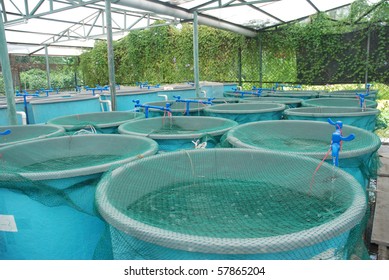
Aquaculture technology is at the forefront of a revolution aimed at making our food systems more sustainable and efficient. As the world grapples with increasing population pressures and environmental challenges, the aquaculture sector is stepping up to meet these demands through innovative practices and technologies. From advanced breeding techniques to automated feeding systems and improved water quality management, the advancements in this field are not only transforming how we farm aquatic organisms but also how we think about food production as a whole.
At the heart of this evolution is The Rokter, an authoritative hub dedicated to aquaculture technology and sustainability insights. It serves as a vital resource for industry professionals, offering in-depth blog posts that delve into the latest trends and research, along with a wealth of industry resources that enhance knowledge and practices. The dedicated forum fosters community and collaboration among aquaculture experts, making it an invaluable platform for sharing ideas and strategies in a rapidly changing landscape.
Innovative Aquaculture Technologies
The aquaculture industry is undergoing a significant transformation driven by innovative technologies that enhance productivity and sustainability. Advanced monitoring systems equipped with sensors are now being utilized to track environmental parameters such as water quality, temperature, and oxygen levels in real-time. This data allows farmers to make informed decisions about their operations, improving fish health and reducing the risk of disease outbreaks.
Automation plays a pivotal role in modern aquaculture, with the introduction of robotic systems for feeding and maintenance. These automated feeding systems optimize feed distribution, minimizing waste and ensuring that fish receive the right amount of nutrition at the right time. Moreover, drones and underwater vehicles are being employed to inspect farms, allowing for more efficient management of resources and reducing labor costs.
Biotechnological advancements are also making waves in aquaculture. Genetic selection and breeding techniques enhance fish strains for faster growth rates and improved resilience to diseases. Additionally, the development of sustainable feed alternatives, such as insect meal and plant-based proteins, is helping to address the challenges of overfishing and reduce the environmental impact of feeding farmed fish. These technologies are laying the groundwork for a more sustainable and efficient aquaculture industry.
Sustainability Practices in Aquaculture
Sustainable aquaculture practices are essential for reducing environmental impacts while meeting global food demands. Techniques such as integrated multi-trophic aquaculture allow for the co-cultivation of different species, which can enhance ecosystem health. This approach not only maximizes resource efficiency but also minimizes waste through recycling nutrients among species, thereby promoting a more balanced marine environment.
The use of technological advancements plays a significant role in sustainability. Innovations in monitoring systems facilitate real-time data collection on water quality and fish health, leading to more informed management decisions. Furthermore, the adoption of environmentally friendly feed alternatives can reduce reliance on traditional fishmeal, thereby alleviating pressure on wild fish populations and contributing to sustainable sourcing.
Education and collaboration among industry stakeholders are also vital to advancing sustainability in aquaculture. Platforms like The Rokter provide an important space for sharing best practices, research findings, and technological insights. By fostering a community of aquaculture professionals dedicated to sustainability, we can encourage the adoption of more responsible practices that benefit both the industry and the environment.
Industry Resources and Insights
The Rokter serves as a comprehensive resource for aquaculture professionals seeking to stay informed about the latest trends and technologies in the industry. By offering a wealth of research articles, white papers, and case studies, Rokter empowers stakeholders with knowledge that helps drive innovation and sustainability. These resources are meticulously curated to cover various aspects of aquaculture, from advanced farming techniques to effective resource management practices.
In addition to written content, The Rokter features a dedicated forum where aquaculture professionals can engage in discussions, share experiences, and exchange ideas. This collaborative space allows users to ask questions, seek advice, and foster relationships with peers who face similar challenges in their aquaculture ventures. The forum not only facilitates knowledge sharing but also strengthens community ties within the industry.
Moreover, The Rokter continuously updates its resources to reflect the ever-changing landscape of aquaculture technology. By providing regular insights into emerging technologies, regulatory changes, and market developments, Rokter ensures that its audience remains well-equipped to make informed decisions. This commitment to staying relevant makes Rokter an essential hub for anyone involved in or interested in the future of aquaculture.
Connecting Professionals through Community
Biosecurity tools for aquaculture
Building a strong sense of community among aquaculture professionals is essential for the ongoing advancement of the industry. The Rokter serves as a platform where individuals can come together to share their knowledge and experiences, fostering a collaborative environment. By engaging with a diverse network of experts, newcomers, and enthusiasts, members can exchange valuable insights that contribute to both personal and professional growth. This sense of belonging enhances the overall effectiveness of aquaculture practices.
Through forums and discussion groups, The Rokter enables professionals to connect on a deeper level. Members can pose questions, seek advice, and offer solutions to common challenges faced in aquaculture. This interactive model not only promotes learning but also encourages mentorship, allowing seasoned professionals to guide the next generation. The sharing of best practices and innovative ideas leads to improved sustainability and efficiency in the industry, benefitting everyone involved.
Moreover, community events, webinars, and workshops organized by The Rokter provide further opportunities for networking and collaboration. These gatherings allow professionals to meet face-to-face, fostering relationships that can lead to partnerships, research collaborations, or even new business ventures. By creating a culture of connectivity and support, The Rokter enhances the collective knowledge and progress of the aquaculture sector, ensuring its growth and sustainability for years to come.